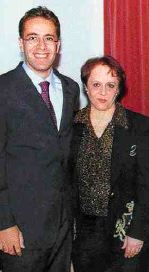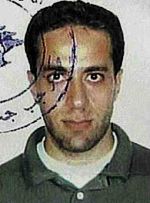
Reuters
Ziad Jarrah is shown with his mother in this family photo taken in
Beirut in February.
|

The Associated Press
Ziad Jarrah in a photo released after the Sept. 11 hijackings.
|
WESTERN BEKAA, Lebanon - To his family, Ziad Jarrah was a cherished only son, betrothed to a Turkish medical student, with a new Mercedes and a villa awaiting him in Lebanon.
To the world, Jarrah will be remembered as a terrorist, responsible for one of the most heinous crimes in history.
U.S. authorities say Jarrah, 26, helped hijack United Airlines Flight 93, a Boeing 757 that left Newark, N.J., for San Francisco on Sept. 11.
The plane crashed short of its target -- possibly the White House -- ending up in a field in rural Pennsylvania. Everyone on board was killed. There is evidence a struggle took place between the hijackers and the passengers before the plane went down.
Jarrah's family is at a loss to explain how this man, who was not an Islamic fundamentalist and was not anti-American, could possibly be a hijacker filled with hate, one of 19 killers to commandeer four planes and crash them into targets that included the World Trade Center and the Pentagon.
"It is impossible. I can't believe my son has done such a thing," said Samir Jarrah, his 60-year-old father, weeping in the living room of the family's summer home in dusty al-Marj, a town in the Bekaa Valley, 50 kilometres from Beirut. "Does he have the features of a terrorist?"
A photograph of Ziad Jarrah shows a young, clean-shaven man in Western clothes; the picture sits on a desk in a room with an antique silk rug from Israel that is decorated with Hebrew letters and the Star of David.
The Jarrah family are Sunni Muslims, and they are not particularly devout.
"I drink, and so does he," explains Mr. Jarrah, a scar from his recent heart bypass operation visible under his open-neck shirt. "We released a videotape of Ziad at a recent wedding, dancing and enjoying himself."
He last saw his son in January, when Ziad Jarrah returned to Lebanon and maintained a 24-hour hospital vigil at his father's side.
Mr. Jarrah last spoke with his son just two days before the terrorist attacks. There was nothing memorable about the phone conversation; they joked about the new car he had purchased for Ziad and how his sister would take the Mercedes if he didn't come home soon. "He was happy. He said he was coming to Lebanon in 10 days," he says. "May God prove he had nothing to do with any of this."
Was Jarrah an innocent passenger, a victim of circumstantial evidence? Or did he lead a double life, one that took him into contact with radical Islamic extremists and, eventually, with the other hijackers? If he did, he kept his secret life so well hidden, no one, not even his girlfriend, suspected.
By all accounts, Jarrah did not fit the profile of a man filled with anger.
He grew up in a comfortable family, doted on by his parents and younger and older sisters. Mr. Jarrah, a government bureaucrat and small businessman who owns three houses, wanted his only son to be well educated and sent him to Hikmeh, a Christian school in Beirut.
"I'd put money in his pockets. He never had to ask for anything," said Mr. Jarrah. The family spent summers at the Jarrahs' sprawling white-washed home in the fertile Bekaa Valley, located between two mountain ranges. The summer home is next to both a mosque and a church, and Jarrah appeared to fit easily into both worlds.
He volunteered with the Anti-Drug Youth Association, a group founded by a priest. He also worked for a time with an association for the disabled, taking disabled children camping in Jbail, an ancient and predominantly Christian city. He loved to play basketball.
In 1995, his family agreed to send him to study the career of his dreams: aircraft design at Hamburg's University of Applied Sciences. It was there that he met and began to date Aisle Senguen, a German-born Turk who was studying medicine.
Although there is no proof, it was also here that he may have fallen under the spell of Islamic extremists. Hamburg is considered a hub for the terrorist cause, and is home to several associates of Osama bin Laden, the exiled Saudi millionaire and main suspect in the terrorist attacks.
Two other hijackers -- Mohamed Atta and Marwan al-Shehhi, who allegedly flew the planes that struck the World Trade Center -- also studied in Hamburg. German authorities believe the two men and Jarrah were part of a cell formed there to attack targets in the United States. They found "airplane-related documents" in the home of Ms. Senguen.
Jarrah's girlfriend, however, denies he even knew the two alleged hijackers, and told Jarrah's family she had never heard their names mentioned. (The family also denies Jarrah ever travelled to Afghanistan.)
By accident or design, Jarrah soon found himself following in the footsteps of Atta and al-Shehhi once again. By last year, all three men had moved to Florida to take flight training lessons. Mr. Jarrah says his son first travelled to Seattle and then to Florida, where he signed up at the Florida Flight Training Center in Venice (Atta and al-Shehhi studied at a different school.)
Jarrah also signed up at a fitness centre in Fort Lauderdale, where he told instructors he wanted to learn kick-boxing, street fighting and martial arts. In June, he moved to Lauderdale-by-the-Sea, where he roomed with Ahmed Alhaznawi, another suspected hijacker. Jarrah kept in close touch with his family, calling once a week. When his fiancée flew to Lebanon in August, Jarrah was supposed to accompany her, but could not because he had flight exams. "She came with his suit and her bridal clothes," recalled Mr. Jarrah.
He sent his son $2,000 a month and recently sent him an extra $700 after he requested more cash. "Just today, I received a deed from the government to build an 800-metre villa on a piece of land in Ziad's name," said Mr. Jarrah, taking the piece of paper out of his pocket and slowly unfolding it, shaking his head in grief. "Now I don't know if it will ever be built."
It is mid-afternoon and the Muslim prayer call can be heard through the open window of Mr. Jarrah's living room. He looks down at the cellphone that is never far from his side, as though willing it to ring with good news. He does not believe his son was a suicide pilot. Some days, he even has trouble believing he is dead. "I think he is in America maybe, in prison," he says. "Either that, or he died in the plane crash, but as a passenger."